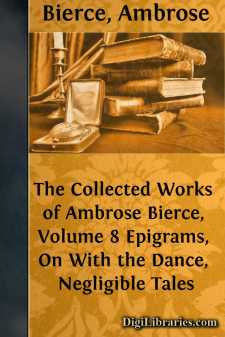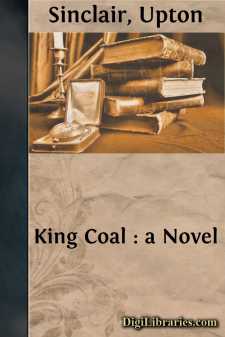Categories
- Antiques & Collectibles 13
- Architecture 36
- Art 48
- Bibles 22
- Biography & Autobiography 813
- Body, Mind & Spirit 142
- Business & Economics 28
- Children's Books 17
- Children's Fiction 14
- Computers 4
- Cooking 94
- Crafts & Hobbies 4
- Drama 346
- Education 46
- Family & Relationships 57
- Fiction 11829
- Games 19
- Gardening 17
- Health & Fitness 34
- History 1377
- House & Home 1
- Humor 147
- Juvenile Fiction 1873
- Juvenile Nonfiction 202
- Language Arts & Disciplines 88
- Law 16
- Literary Collections 686
- Literary Criticism 179
- Mathematics 13
- Medical 41
- Music 40
- Nature 179
- Non-Classifiable 1768
- Performing Arts 7
- Periodicals 1453
- Philosophy 64
- Photography 2
- Poetry 896
- Political Science 203
- Psychology 42
- Reference 154
- Religion 513
- Science 126
- Self-Help 84
- Social Science 81
- Sports & Recreation 34
- Study Aids 3
- Technology & Engineering 59
- Transportation 23
- Travel 463
- True Crime 29
Sort by:
by:
Francis Bowen
THEORY OF CREATION. Vestiges of the Natural History of Creation. New York: Wiley & Putnam. 1845. 12mo. pp. 291. This is one of the most striking and ingenious scientific romances that we have ever read. The writer of it is a bold man; he has undertaken to give a hypothetical history of creation, beginning, as the title-pages say, at the earliest period, and coming down to the present day. It is not...
more...
by:
Warwick Goble
The Visitor from the Cellar. The whole house in London was dull and gloomy, its lofty rooms and staircases were filled with a sort of misty twilight all day, and the sun very seldom looked in at its windows. Ruth Lorimer thought, however, that the very dullest room of all was the nursery, in which she had to pass so much of her time. It was so high up that the people and carts and horses in the street...
more...
by:
Joseph Byron
CHAPTER I. The hour was late and the theatres were emptying. The crowds, coming from every direction at once, were soon a confused, bewildered mass of elbowing humanity. In the proximity of Broadway and Forty-second Street, a mob of smartly-dressed people pushed unceremoniously this way and that. They swept the sidewalks like a resistless torrent, recklessly attempting to force a path across the...
more...
by:
Ambrose Bierce
My name is John Brenwalter. My father, a drunkard, had a patent for an invention, for making coffee-berries out of clay; but he was an honest man and would not himself engage in the manufacture. He was, therefore, only moderately wealthy, his royalties from his really valuable invention bringing him hardly enough to pay his expenses of litigation with rogues guilty of infringement. So I lacked many...
more...
by:
Upton Sinclair
INTRODUCTION Upton Sinclair is one of the not too many writers who have consecrated their lives to the agitation for social justice, and who have also enrolled their art in the service of a set purpose. A great and non-temporizing enthusiast, he never flinched from making sacrifices. Now and then he attained great material successes as a writer, but invariably he invested and lost his earnings in...
more...
by:
Jean-Henri Fabre
CHAPTER I: THE BLACK-BELLIED TARANTULA The Spider has a bad name: to most of us, she represents an odious, noxious animal, which every one hastens to crush under foot. Against this summary verdict the observer sets the beast’s industry, its talent as a weaver, its wiliness in the chase, its tragic nuptials and other characteristics of great interest. Yes, the Spider is well worth studying, apart...
more...
It was a dull evening in the month of September, 1728. The apprentices had closed and barred the shutters and the day's work was over. Supper was laid in the long room over the shop, the viands were on the table, and round it were standing Bailie Anderson and his wife, his foreman John Gillespie, and his two apprentices. The latter were furtively eying the eatables, and wondering how much longer...
more...
CHAPTER I The man in the corner pushed aside his glass, and leant across the table. "Mysteries!" he commented. "There is no such thing as a mystery in connection with any crime, provided intelligence is brought to bear upon its investigation." Very much astonished Polly Burton looked over the top of her newspaper, and fixed a pair of very severe, coldly inquiring brown eyes upon him....
more...
by:
Laura Lee Hope
CHAPTER I A STRANGE RESCUE "Can't I have a ride now, Russ? You said it would be my turn after Mun Bun." "Yes, but, Margy, I haven't had enough ride yet!" declared Mun Bun. "But when can I get in and have my ride?" The three little children, two girls and a boy, stood in front of their older brother, Russ, watching him tying an old roller skate on the end of a board....
more...
by:
Jackson Gregory
STEVE DIVES INTO DEEP WATERS Steve Packard's pulses quickened and a bright eagerness came into his eyes as he rode deeper into the pine-timbered mountains. To-day he was on the last lap of a delectable journey. Three days ago he had ridden out of the sun-baked town of San Juan; three months had passed since he had sailed out of a South Sea port. Far down there, foregathering with sailor men in a...
more...











